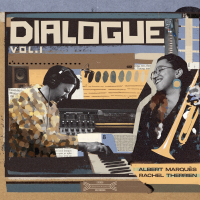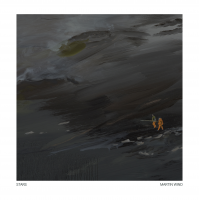Home » Jazz Articles » Album Review » Alan Skidmore: After The Rain
Alan Skidmore: After The Rain
Perhaps the exceptions have been few but they have been mighty. Think only of Charlie Parker—With Strings, Art Pepper's Winter Moon, Paul Desmond's Desmond Blue and, more recently, British trumpeter Guy Barker's What Love Is with orchestration and arrangements courtesy of Colin Towns. Eight of the thirteen arrangements on After The Rain come from Towns' pen.
Skidmore is well-known for his deep respect and affection for John Coltrane. Just as Coltrane turned aside from the tumult of his early-mid-sixties work to record Ballads, Skidmore reveals a sometimes forgotten side to his musical personality—his rare ability to embrace and caress a melody. Unconsciously perhaps, twelve of the thirteen standards he chose were recorded at various times by the master, the odd-one-out being the opener here, "I Remember Clifford." There is not a single track here that wouldn't bring comfort in the enforced solitude of a desert island. (Note for non-British readers -Desert Island Discs is one of British radio's longest running programmes.) Ably accompanied by his regular pianist, Steve Melling, Skidmore seems to coax from these tunes a tenderness and warmth that would surprise even their authors. His take on Coltrane's "Naima" with an arrangement by Jorg Achim Keller (incidentally, Skid's daughter is named 'Alice' after 'Trane's second wife and his granddaughter, 'Naima') is achingly beautiful, while the version of "Nature Boy" is as fine Nat King Cole's original.
On "It's Easy To Remember" Towns conjures a cinematic grace to an introduction that somehow makes Skid's entry all the more anticipated and appreciated. A solo violin precedes the saxophonist's final choruses in an additional moment of quiet drama. Skidmore's solo on Coltrane's "After The Rain" is rich in sentiment and free of any hint of mawkishness. "Theme For Ernie" features a lush, if more straightforward, arrangement from ," arranged by Horst Mühlbradt but again frames a solo in which not a note is out of place. Mühlbradt's decision at one point to shadow the saxophone with a single bassoon is a master stroke. The arranger's take on "My One And Only Love" is similarly rich and concludes with a beautifully poised cadenza from Skidmore.
Every time I play After The Rain, I hear something fresh—and in Colin Towns' arrangements particularly so. An oboe essaying the tune before the saxophone returns on "Ev'ry Time We Say Goodbye" or the contrast between flute and bassoon on the introduction to Duke' "In A Sentimental Mood," being just two examples. If I had to pick a track from this great collection, it would probably be "Nature Boy" but the warmth and individuality that Skidmore brings to Coltrane's "Central Park West" is a joy that would run it close.
One time after a gig, a couple of fans approached Skidmore with one saying to the saxophonist, "You're so lucky being able to play like that." Skid's wife Kay was there. Her reply was swift and cutting—"Yes, and it's funny but the more he practises, the luckier he gets." Practice makes perfect.
Track Listing
I Remember Clifford; It’s Easy To Remember; After The Rain; Nature Boy; Too Young To Go Steady; Theme For Ernie; Naima; Nancy; My One And Only Love; Ev’ry Time We Say Goodbye; In A Sentimental Mood; Where Are You?; Central Park West.
Personnel
Alan Skidmore
saxophoneAlan Skidmore (tenor saxophone); Steve Lelling (piano) - Tracks 1, 2, 4-9, 11 & 12 Radio Philharmonie Hannover des NDR; Tracks 3, 10, 13 Colin Towns’ Mask Symphonic.
Album information
Title: After The Rain | Year Released: 2017 | Record Label: Miles Music
Tags
PREVIOUS / NEXT
Support All About Jazz
 All About Jazz has been a pillar of jazz since 1995, championing it as an art form and, more importantly, supporting the musicians who make it. Our enduring commitment has made "AAJ" one of the most culturally important websites of its kind, read by hundreds of thousands of fans, musicians and industry figures every month.
All About Jazz has been a pillar of jazz since 1995, championing it as an art form and, more importantly, supporting the musicians who make it. Our enduring commitment has made "AAJ" one of the most culturally important websites of its kind, read by hundreds of thousands of fans, musicians and industry figures every month.






















